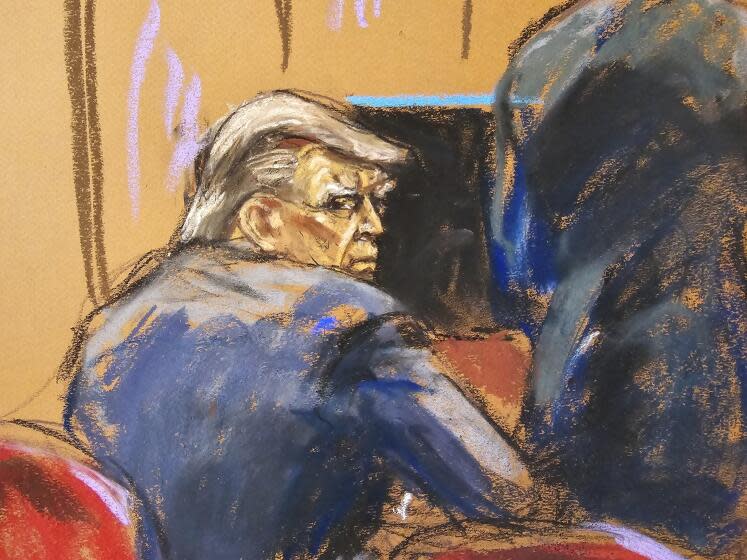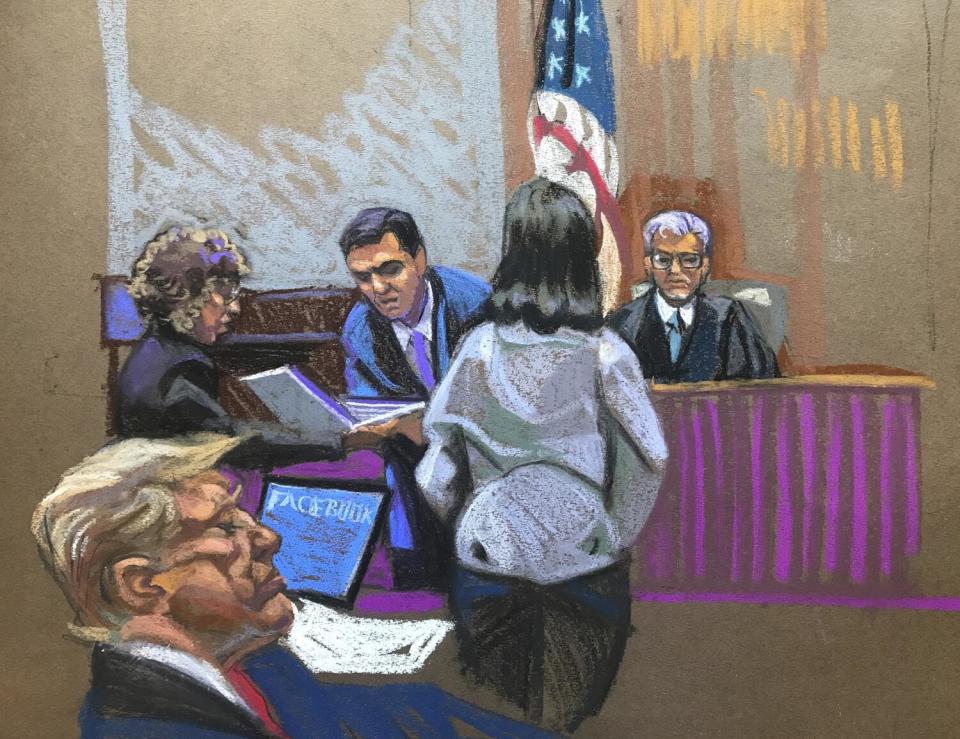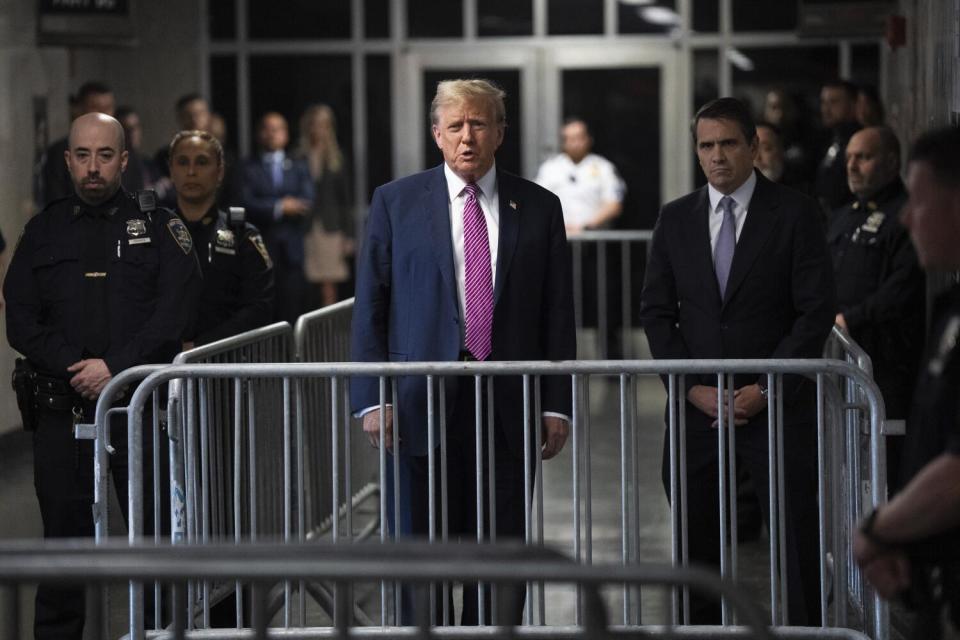Column: Trump's hush-money criminal trial could be a cure for 'Trump amnesia'

Before Donald Trump's hush-money trial in New York got underway, pundits predicted that the proceedings could be a media bonanza for the former president. During this year’s Republican primaries, they noted, Trump’s popularity rose every time he was indicted.
But so far, the trial, on charges that Trump covered up illicit payments to an adult filmmaker and actor to influence the 2016 election, hasn’t made him look like much of a hero.

He’s appeared to fall asleep in the courtroom more than once. He’s grumbled at potential jurors. He’s been reprimanded by the judge. He looks more like an desperately unhappy defendant than a potential commander in chief.
And it’s likely to get worse. Over the next six weeks, the trial may include testimony from Stormy Daniels, the porn performer with whom Trump allegedly had a one-night stand, and Karen McDougal, a former Playboy model who accepted money to conceal another alleged affair.
The tawdry details will produce plenty of tabloid drama — but not the kind Trump reveled in when he was a young, publicity-hungry mogul. (Trump has denied having affairs with the women.)
More important, the trial might begin to cure voters of the affliction known as “Trump amnesia” — the tendency to forget all the reasons they voted against the presumptive Republican nominee in 2020.
Pollsters and campaign consultants who conduct focus groups, organized discussions with voters, say they run into it all the time.
Read more: Trump’s trial is about more than sex and money. It’s about what presidents ‘can get away with’
Celinda Lake, one of President Biden’s pollsters, said she discovered the syndrome when she asked voters how they felt about Trump’s impending trial over the events surrounding the violent Jan. 6, 2021, invasion of the Capitol.
“What court case?” one of the voters asked.
“These were swing voters, and about half of them weren’t sure what we were talking about,” Lake recalled. “And I said, ‘Well, you know, the insurrection, and that he was the one who provoked it.’ They go: ‘Oh, yeah, I kind of forgot about that.’ ”
The reasons for the epidemic of memory loss aren’t mysterious. Trump left office more than three years ago — and for the last two years, voters have been focused on rising prices and mortgage rates, problems they blame on Biden.
Read more: Opening statements set for Monday in Trump's hush money criminal case
When Trump left office in 2021 after his followers sacked the Capitol, the Gallup Poll logged his approval rating at a dismal 34%. By last year, with memories no longer so fresh, voters' views had softened: 46% said they thought his presidency had been pretty good — a phenomenon some have called “Trump nostalgia.”

Trump has stoked that trend over the last three years by claiming ceaselessly that he produced “the greatest economy in the history of the world” (it wasn’t) with “no inflation” (also untrue).
Democrats and anti-Trump Republicans hope the trials could dent the former president’s support by changing the focus of news coverage, at least for a time, to his many misdeeds.
Trump is facing four different criminal prosecutions: separate federal and Georgia indictments accusing him of trying to undo the 2020 election, a federal indictment accusing him of illegally holding classified documents, and the New York hush-money case. It’s not certain that any of the other three will reach trial by the election.
If he is convicted in any of the four proceedings, polls suggest that a significant number of voters might well desert him.
Read more: Column: Trump has big plans for California if he wins a second term. Fasten your seatbelts
A Reuters/Ipsos poll this month reported that 13% of voters who currently favor Trump say they won’t vote for him if he is convicted of a felony.
If even a fraction of those voters carry out their threat, the former president’s apparent lead over Biden could evaporate. In 2020, a vote shift of less than a percentage point in three close-run states would have changed the outcome in the electoral college.
It’s reasonable to ask whether a conviction in the New York case, which legal scholars consider the weakest of the indictments Trump faces, would affect voters’ behavior.
But polls have found that most voters believe the hush-money charges qualify as weighty crimes despite their tawdry origins. In the Reuters/Ipsos poll, 64% of respondents said they consider the New York charges serious, including 40% of Republicans.
Not everyone is convinced.
“I think the Biden campaign is whistling past the graveyard on this,” said Whit Ayres, a veteran Republican pollster who is not working for Trump. “The issue is not whether voters remember Trump’s antics. The issue is that they are accurately remembering the economic differences between the two presidencies.”
All of which is true.
Chances are, the hush-money trial in New York isn’t going to swing the election by itself.
But if Trump is convicted of a felony — especially if he is also convicted in more than one of the four trials he faces — that could change enough votes to make a difference in an election that’s likely to be razor-close.
At the very least, the New York trial isn’t doing Trump any measurable good, despite his daily denunciations of the judge, the prosecutor and the gag order that doesn’t seem to be gagging him.
No wonder he looks so annoyed.
This story originally appeared in Los Angeles Times.


